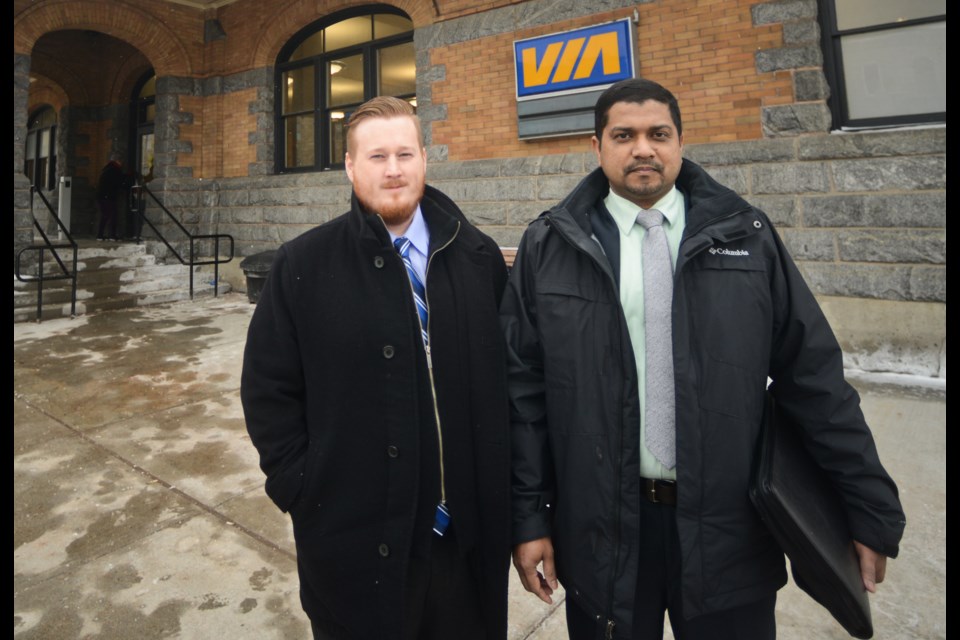Former security guards with first-hand knowledge of working at the Guelph VIA Rail station were saddened, but not surprised, when they heard of last week’s death of a former colleague.
A 21-year-old Guelph man has been charged with the second-degree murder of Mario Ruffolo, who died following a confrontation at the station on Jan. 15.
“I’m not surprised and I’m not surprised it didn’t happen sooner,” said Matthew Hunter, a former senior mobile supervisor with GardaWorld, the security company that provides guards to the station.
“It’s common knowledge that the VIA station was a bad site to work at,” Hunter said. “Not a lot of guards like to work that site.”
Biju Scaria was a security guard at the station for two years.
“It’s such a dangerous place to work. A dangerous area with the potential for violence,” said Scaria, who mentions a time someone pulled a knife in an attempt to intimidate him, the countless needles found and drug overdoses in the washrooms.
“No safety equipment. No special training (after being hired). Nothing,” Scaria said.
Both men knew the kind, quiet and unassuming victim well.
“He was a quiet, older man just trying to save some money for retirement. He talked about how he would be finishing soon,” Hunter said of the slightly-built 63-year-old Ruffolo.
“He was not the type of individual I would put in a high risk site,” Hunter said.
Scaria said he was "furious" when he heard of Ruffolo’s death.
"I believed something bad might happen there," Scaria said.
Hunter said he was let go by GardaWorld earlier this year, shortly after a three-hour meeting with company managers where he brought up a number of concerns.
Scaria, a lawyer in his native India before coming to Canada, left GardaWorld in 2018 and is now a lawyer in Guelph.
Like all licenced security officers in Ontario, Scaria did a 40-hour training course necessary to get his licence. After four years with GardaWorld he was making $14.15 an hour.
He worked as a security guard to help provide for his wife and two children while qualifying to practice law in Ontario.
Scaria said he asked for more safety equipment several times when he worked there but was denied.
Last December, still upset about the situation even though he no longer worked there, Scaria filed a work safety complaint with the Ministry of Labour last year. He was told by the ministry to take his concerns up with the union that represents the guards.
GardaWorld’s head office was asked to respond to the comments and allegations of the former guards and about its safety protocols.
The company told GuelphToday that it could not respond to specific questions while the matter was under investigation.
They did issue a statement via email:
“Since this matter is under investigation, we can not answer specific questions.
This being said, we wish to state that for GardaWorld, the safety of our employees is our main concern. We have robust on-boarding and training programs as well as security protocols in place for our security guards. Our policies and procedures must also meet provincial regulations in place — whether from a permitting or training perspective — which may differ from province to province.
Depending on each contract, additional training may be required for the employees (i.e. Customer Service, Report Writing, etc.).
As you can understand, we cannot provide more detailed information regarding training or other measures in place for security reasons for our employees.
Scaria said that while working as a guard at the VIA station the only equipment he had was a radio connecting him to the City of Guelph bylaw office and his own phone.
Hunter and Scaria both say that security guards at high risk areas need more safety measures, including better communication, protective clothing and working in pairs.
Hunter said as a mobile supervisor he was given a protective vest and training on areas such as mental health crisis and use of force.
Scaria, a frontline officer, said he had no training after he was hired.
Both men said many other security guards have safety concerns but are hesitant to go public with them because they still work for the company and need the work.
